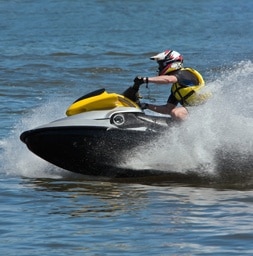 Summer is here and so are adventures in the great outdoors—jetting around the lake in a boat or flying over hills on a dirt bike.
Summer is here and so are adventures in the great outdoors—jetting around the lake in a boat or flying over hills on a dirt bike.
Driving through open terrain on an ATV may be fun, but the truth is that accidents happen on all types of recreational vehicles and vessels, causing hundreds of deaths, thousands of injuries, and millions of dollars in damage.
“Purchasing insurance for your toys is all about peace of mind,” said Rick Stern, boat product manager at Progressive. “If you don’t want to completely pay to replace something, it’s a good idea to have it insured.”
Insuring recreational vehicles and boats isn’t much different than insuring a car. Recreational vehicle or boat insurance rates are based on similar factors: the type of vehicle or boat, where it is used, your driving or boating history, and your credit score. But there are some specifics to consider.
Boats and other watercrafts
When looking for boat insurance, there are two basic insurance policies: the “agreed value” and the “actual cash value,” said Chantal Cyr, vice president of personal insurance for boats and yachts at Travelers.
With an agreed value policy, the boat owner and the company agree on a value of the boat and do not factor in depreciation, Cyr said. These policies cost more up front, but if you get in an accident and your boat is totaled, the insurance company will pay for the agreed value of the boat. The policy can be revised over the years as the boat ages.
An actual cash value policy works similar to a car insurance policy, where depreciation is a factor. If your boat is totaled, the insurance company will pay the amount the boat is worth at the time it is totaled.
Cyr recommends taking a good look at your boat policy, which is more individualized than an auto policy. Some policies cover mechanical breakdown. Some cover salvage costs if your boat sinks. Others cover cleanup costs for fuel spills. Some policies will even have a lay-up credit if your boat is not used during the winter months.
“Boats are a significant investment,” Cyr said. “You just spent $30,000 or $40,000, so you want to buy insurance coverage that protects that investment.”
ATVs and dirt bikes
While ATVs and dirt bikes are certainly not as expensive as boats, they can represent a significant investment for frequent riders. While most state laws do not require that these vehicles are insured, many require some liability insurance if you’re riding on public property.
“It’s a common misconception that your ATV is covered under your homeowner’s policy,” said Charlotte Elek, ATV product manager at Progressive. “In general, you will be covered while riding on your property, but once you leave your property and hit the trail, you’re not covered.”
Like boat and car insurance, you can also get various policies that would cover medical costs, theft, severe damage, and even some wear and tear.
Think about how you use your ATV and check your policy to understand what is covered, Elek said. You may not be covered if your six-year-old child is behind the wheel or you’re using it to clear snow for a business.
Remember that with boat or ATV insurance, you can get discounts for bundling your policy or credits for good driving records or for taking safety courses.
Ilyce R. Glink is the author of several books, including 100 Questions Every First-Time Home Buyer Should Ask and Buy, Close, Move In!. She blogs about money and real estate at ThinkGlink.com and at the Home Equity blog for CBS MoneyWatch.






